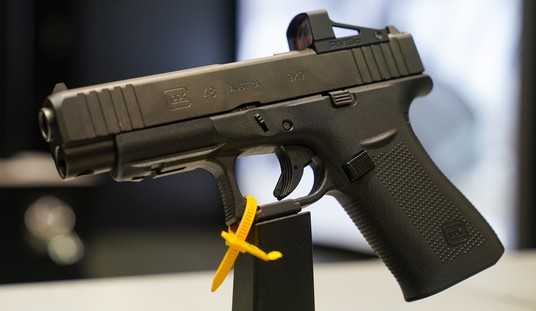Everytown for Gun Safety has released their latest fearmongering report on firearms, this time taking aim at what they claim is a huge spike in the number of guns being stolen from vehicles over the last decade.
According to the anti-gun group, gun thefts from cars, trucks, and SUV's have increased by 300% since 2013, rising to a rate of 63 thefts per 100,000 people as of 2022.
- Of the 112,000 guns reported stolen in 2022, about 51%, or roughly 62,000 weapons, were from stolen from vehicles.
- On average at least one gun is stolen from a car every nine minutes in the U.S, the report stated.
The big picture: The rise in vehicle gun thefts has coincided with increases in gun ownership, adults carrying guns in public and the proliferation of permitless public carry laws.
Now again, these figures come from Everytown, so treat them as skeptically as you'd like. The gun control group used FBI NIBRS data from 159 cities collected between 2013–2022 to come up with their figures, but reporting requirements may have changed in those jurisdictions over the years, so I'm not convinced that the trend is really as pronounced as Everytown claims.
And, of course, this data is presented in order to push for legislative change; in this case, gun storage mandates. From Everytown's conclusions:
- Most immediately, gun owners must always lock their vehicles and secure their guns in those vehicles so that they are not visible. There is a gun safe for sale for every make and model of vehicle and devices that make it easier to securely store guns.
- Local elected officials, community leaders, law enforcement, and others must support public awareness campaigns on how to prevent thefts from cars and the acts of violence that can follow. Proactive efforts are underway in a number of cities. In San Antonio, Texas, a nonprofit alliance is raising funds to purchase and distribute car gun safes. Police in Hoover, Alabama, have reported success with their “Lock It or Lose It” public awareness campaign. In some areas, police departments are working with the ATF or the FBI to produce public service announcements, other agencies are making flyers and handouts to raise awareness and are encouraging gun owners to make their cars less visible targets by removing decals or bumper stickers indicating a firearm may be in the vehicle. And the Be SMART program promotes secure storage nationwide to help parents, caretakers, and community leaders have the knowledge and conversations to keep our communities safe.
- Legislators at all levels must pass laws that are proven to help prevent these thefts. The highest-priority policies are, first, laws that require guns to be securely stored and not visible when left unattended in cars. States including California, Connecticut, and Oregon have done so and can serve as examples. Second, immediate, mandatory reporting of lost and stolen guns enables law enforcement to investigate the theft and any possible gun trafficking, and allows us to better understand where and when these incidents are happening to help focus prevention efforts. Research has shown that these reporting laws can reduce illegal gun movements by 46 percent compared to states without this law.
Does mandatory reporting of lost or stolen firearms really lead to law enforcement investigating those thefts? Not according to a new study from the National Police Institute, which found that most agencies don't view lost or stolen firearms as a "significant issue".
When asked about their experiences with lost and stolen firearm reporting, none of the agencies reported that it was a significant problem in their jurisdiction, and none reported a significant volume of lost or stolen firearm reporting or recoveries. More than one participant reported no reports of lost firearms. The executive from the largest agency participating, which serves a population of more than one million people, reported that the agency had received only 29 reports of lost firearms for the year as of November. Without exception, the participants noted stolen firearm recoveries as routine, but none reported it to be a significant issue. Because we know that firearm thefts do not occur evenly across the states and cities, these findings are not entirely surprising. Even in places where gun violence occurs regularly, agencies may not believe that lost or stolen firearms are a major driver of their gun crime problems or concerns. In terms of stolen firearm recoveries, focus group participants maintained that they did not see a high volume of stolen firearms—or firearms reported as stolen—being recovered at crime scenes.
The law enforcement officers that the study's authors spoke to also poured cold water on the idea that cops are making it a priority to search for stolen firearms.
During structured interviews with agency representatives (not associated with the focus group), interviewees raised the issue of staffing. In more than one instance, the interviews revealed that little to no investigation is done by the agency taking the report of a lost or stolen firearm unless the firearm theft was part of a more serious offense such as robbery or burglary. This may be particularly true when the reporting party has limited or no details or identifying information regarding the firearm, including serial number, make, model, etc.
So much for the idea that "lost or stolen" legislation is an actual solution to stealing guns. But if Everytown is so concerned about this issue, I do have a couple of suggestions that they left off of their call to action.
First, reduce "gun-free zones". People are less likely to leave their gun in their car if they can carry it with them, so the fewer "sensitive places" there are, the more firearms will be carried by their owners.
Secondly, increase the penalty for stealing guns, which in many jurisdictions could be a simple misdemeanor depending on the value of the firearm. If straw purchasing and gun trafficking are felony-level offenses, why isn't the theft of a firearm considered the same?
Instead of cracking down on criminals, Everytown wants lawmakers to go after gun owners who are the victims of a crime. That's certainly on-brand for the anti-gun group, but it's the wrong approach to reducing gun thefts.









Join the conversation as a VIP Member